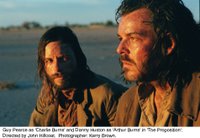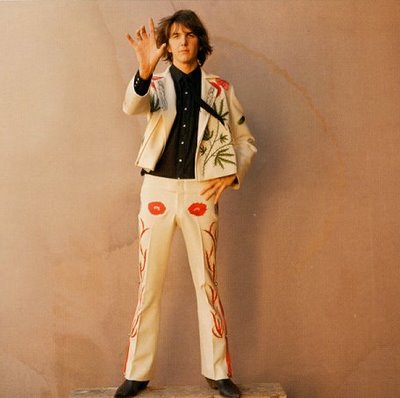the proposition

what happens to people that god forgets? "the proposition" a stunning australian film written by musician nick cave and directed by john hillcoat, cannot answer that question, but attempts to at least show us the residue of godlessness, and provokes the imagination to consider what hell looks, smells, sounds, and tastes like. this feral yet poetic western, which takes place in the australian outback circa 1880, juxtaposes civility with vileness, beauty with the revolting, sentiment with contempt, and compassion with misanthrope.
guy pearce ("momento" and "l.a. confidential") portrayed charlie burns, an irish outlaw at odds with not only the english colonists seeking to bring refinement to the aboriginal land, but also with his brother and his gang, arthur burns, a john the baptist meets charles manson type figure living in the wilderness, played to perfection by danny huston ("the constant gardner" and "21 grams").
 the proposition raised by captain stanley (ray winstone) is simple: kill your brother arthur for the crimes he has committed, or watch your innocent, young, naive, brother, hang for those crimes. it's not so much a proposition but an ultimatum. regardless, the rest of the film spirals through hell in a manor that would leave william shakespeare wanting.
the proposition raised by captain stanley (ray winstone) is simple: kill your brother arthur for the crimes he has committed, or watch your innocent, young, naive, brother, hang for those crimes. it's not so much a proposition but an ultimatum. regardless, the rest of the film spirals through hell in a manor that would leave william shakespeare wanting.some have called this a "violent" western. maybe more "violent" than peckinpah or leone. i'm not sure how to quantify violence, but i can say that this film depicts an evil i have seldom encountered. for those who believe that the kingdom of god is at hand, it must also be considered that hell is lurking in the shadows as well. in the midst of high tea, rose bushes, fine china, green christmas trees, and the delicate features of martha stanley (emily watson), hell manifests itself with the constant buzz of biting flies, decomposing meat, primal urges, and drunken debauchery. poetry that would make an angel weep, is spouted before execrable acts that would cause a demon to cry.
 in errol morris' documentary "the fog of war", robert macnamara's ninth lesson is "in order to do good, you may have to engage in evil." "the proposition" is an excellent anecdote in this principal. without being dogmatic or didactic, cave and hillcoat put shoe leather to the means which lead to an end. make no mistake, this film is not guided by moralism or principal. it is a lens through which the world is viewed, that does not make sense, have conclusion, redemption, or epiphany. it however does lead one down a path of reflection, and ultimately, what more can one ask for.
in errol morris' documentary "the fog of war", robert macnamara's ninth lesson is "in order to do good, you may have to engage in evil." "the proposition" is an excellent anecdote in this principal. without being dogmatic or didactic, cave and hillcoat put shoe leather to the means which lead to an end. make no mistake, this film is not guided by moralism or principal. it is a lens through which the world is viewed, that does not make sense, have conclusion, redemption, or epiphany. it however does lead one down a path of reflection, and ultimately, what more can one ask for.this is a startling film, that deserves attention. it is full of beautiful imagery, craftful cinematography, skillful acting, and a haunting soundtrack as one might expect (not only from nick cave, but also from jim white). enter it ready to be engaged, repulsed, and provoked. westerns as a genre, much like zombie films, are often parallels to the culture in which they are made. "the proposition" is no exception. this film will take it's place along side "high noon," "the man who shot liberty valance," "the wild bunch" and "the good, the bad, and the ugly."





